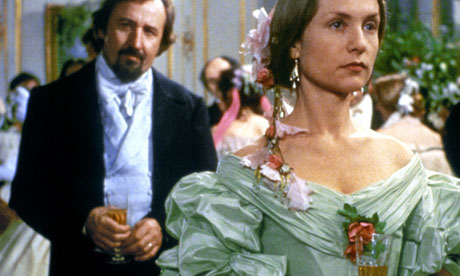 |
| Isabelle Hubert as Madame Bovary, 1991
By Gustave Flaubert, trans. Lydia Davis, New York: Viking, 2010, p. 342
Reading Madame Bovary is an exercise in ambivalence. I want to strangle the heroine because she is so self-absorbed and conventional. On the other hand, her search for romantic transcendence feels quite familiar to my own longings. Emma Bovary is married to a provincial doctor who she dismisses as an oaf. Motherhood leaves her cold. She has a series of extramarital affairs, shops her way to financial ruin, and swallows arsenic when her disappointments overwhelm her. This plot outline, however, misses the point of the novel. Madame Bovary is a psychological portrait. Emma wants to remake herself in the model of romantic heroine. Her identity is grounded in a fantasy of aristocratic splendor and amorous achievement. She is especially alive to the power to material elegance. She dresses herself in the height of fashion, and her home is constructed as a stage set that highlight her personal attributes. For Emma, outward beauty is a sign of inner grace. Flaubert brings the physical world alive for the reader through the articulation of concrete detail. The ladies at a ball, for example, shimmer before us: "Along the line of seated women, painted fans were fluttering, bouquets half concealed smiling faces, and little gold-stoppered bottles twirled in half-open hands whose white gloves showed the outlines of their nails and hugged their flesh at the wrist. Lace trimmings, diamond brooches, medallion bracelets trembled on bodices, sparkled on chests, clinked on bare arms."I keep expecting Emma to achieve emotional connection, but her poetic desires are forever undercut by the brutish or the mundane. Ironic juxtaposition between a romantic ideal and a prosaic reality, rendered in lyric objective prose, is at the core of Flaubert's style. Emma spends a night at the opera seeing Lucie de Lammermoor, for instance, yet she grows bored and wants to leave before the performance is over. Instead of finding identification with Lucie, "[t]he mad scene was not at all interesting to Emma, and the heroine's acting seemed to her exaggerated." Flaubert took over four years to compose the novel, he discarded much of the material he produced, and Lydia Davis's translation is equally concerned with precision. Julian Barnes offers a thoughtful--if somewhat snippy--evaluation of the translation here. Notes at the back of the book explain obscure cultural references, and the introduction provides an overview of Flaubert's working processes and aesthetic goals. |
A diary devoted to reading the 100 novels cited in Jane Smiley's 13 Ways of Looking at the Novel
Wednesday, January 2, 2013
Madame Bovary
Subscribe to:
Post Comments (Atom)
No comments:
Post a Comment